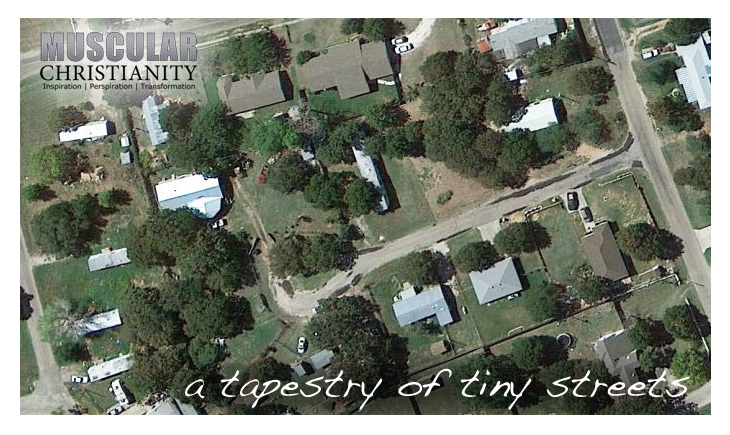Keep Reading
A Destitute Disposition
Have you ever considered the number of Praise and Worship choruses that highlight a destitute disposition? Take a look:
| And on that day when my strength is failing The end draws near and my time has come Still my soul will sing Your praise unending 10,000 years and then forever more (10,000 Reasons)Lord, I come, I confess Bowing here I find my rest And without You I fall apart You’re the One that guides my heart (Lord, I Need You) |
It’s like a constant war And you want to settle that score But you’re bruised and beaten And you feel defeated (It’s Not Over Yet)Amazing grace, how sweet the sound That saved a wretch like me I once was lost, but now am found Was blind, but now I see (Amazing Grace) |
Here are some more…
| Lift your head weary sinner, the river’s just ahead Down the path of forgiveness, salvation’s waiting there You built a mighty fortress 10,000 burdens high Love is here to lift you up, here to lift you high (Lift Your Head Weary Sinner)You hold my very moment You calm my raging seas You walk with me through fire And heal all my disease (Healer) |
Toiling on, toiling on, Toiling on, toiling on, Let us hope, let us watch, And labor till the Master comes (To the Work)So take me as you find me All my fears and failures Fill my life again (Mighty to Save) |
A Lot of Press…
It is entirely appropriate to recall the distance that stands between who we were as spiritual corpses and who we are now as regenerated souls (Eph 2:1, 5). As a matter of fact, when you factor in the Lord’s Supper and the Scriptures that admonish a perpetual attitude of gratitude and humility, it’s evident that acknowledging who we were before Christ is more than a mere courtesy, it’s an act of obedience that we’re commanded to perform in order to maintain a healthy perspective on who we are in Christ (Rom 12:3; 1 Cor 11:26; 1 Thess 5:16-18).
The problem isn’t acknowledging who we were or what we are when we’re choosing to keep all He offers at an arm’s distance. The problem is that, in some instances, there’s a greater emphasis on the darkness of the past as opposed to the bright and motivating scenario we have right in front of us.
Even the way in which the gospel is presented sometimes employs a similar approach to what’s being accomplished as far as “eternal life.” Yes, the problem is sin and the resulting sentence that is certain to be delivered on Judgment Day is a given (Heb 9:27; Rev 20:15). The Scriptures are clear – you need to be born again in order to ensure that when the results are tallied, you are welcomed into Heaven as opposed to being condemned to an eternity of suffering (Jn 3:3, 16). But if that’s the the principal, if not the only, impetus for asking Christ into your heart, then it’s all about avoiding the lake of fire and that’s what gets filed away in the mind of the person who accepts Jesus as their Savior. If you ask them, even years after the fact, “Why would a person want to be saved?” their response will often center around getting their “get out of jail free” card and that’s it.
The bottom line is that there’s a lot of press given to the desperate plight that is ours apart from Christ. And while it’s not wrong or unhealthy to recognize the stark and morbid condition of our lives sans the Power and grace of God, one needs to keep reading in order to ensure a comprehensive appreciation for all that a relationship with Christ brings to the table.
Keep Reading
In Romans 7:24-25, Paul says:
“What a wretched man I am! Who will rescue me from this body of death?” (Rom 7:24)
You’ve got to wonder if Peter didn’t have the same kind of thoughts running through his mind after having sworn up and down that he didn’t even know Who Jesus was on the night He was crucified (Matt 26:69-75). This is a man who insisted that he would die before he disowned his Master.
Shame.
By the 21st chapter of John, Peter has seen, not only the empty tomb, He has seen Jesus in Person. In Luke 24:24, Jesus appeared to him personally and he was with all the other disciples sans Thomas in John 20 when Jesus appeared to them as a group. His disposition has improved dramatically since the night of the crucifixion, but he has yet to sit down with Christ and address the thing that’s been gnawing at him for the last several days – the fact that he deserted his King in every sense of the word on the night it mattered most.
Guilt.
In John 21:15-17, Jesus asks Peter a total of three times whether or not he loved his Savior to coincide with the number of times Peter insisted that the two of them had never crossed paths. In so doing, He reinstates Peter and the guilt that was weighing on him is removed, but…
By the second chapter of Acts, there are about 120 people that are meeting with Peter and the other disciples. While they’re praying and worshiping, they’re keeping a fairly low profile. Despite they’re having been profoundly impressed and encouraged by the fact their Messiah has risen from the grave, they’re not being especially vocal about it given the fact that Jesus is still perceived by the Jewish and Roman establishment as a heretic and a traitor.
Fear.
Guilt, shame and fear have been assaulting the psyche of Peter for the last month and a half. There have been dramatic spikes of relief and validation, but Pete is still light years removed from being willing to boldly and publicly assert a dead man’s doctrine as being the Way, the Truth and the Life.
But that changes in the second verse of Acts 2. The Mindset, the Manner and the emotional Muscle of God is imparted to Peter and everyone else in the room and in that moment they are fundamentally changed. Whereas a moment ago, Peter was hesitant, if not legitimately scared, of saying anything publicly for fear of the Sanhedrin, he’s now speaking in front of a large crowd of people, 3,000 of which are so sold on what he has to say that they become followers of Christ on the spot. And Peter’s guilt and the shame that had been alleviated is now eliminated entirely (Rom 8:1-2).
Do Great Things
The Mindset, the Manner and the emotional Muscle of God. In other words, His Spirit. That’s the Divine Signature of the believer. If you’ve got His Spirit living in you, you’re born again. If not, you ain’t (Rom 8:9).
The way you think, the way you behave and the way you feel is now founded on the same Holy Strength that put the planets in place and made the heart of Jesus begin to beat again after being lifeless for three days (1 Cor 8:6; Eph 1:18-21; Col 1:27). You haven’t been merely “improved,” you’ve been completely remade (2 Cor 5:17). What was dead is now alive (Eph 2:1; 5). You and I have been spiritually raised up from a lifeless, prone position to an upright stance in order that we may…
…wait for it…
Do great things!
Look…
For we are God’s workmanship, created in Christ Jesus to do good works, which God prepared in advance for us to do. (Eph 2:10)
The Greek word “workmanship” is “poeima,” which is where we get our word “poem” from. As redeemed individuals, you could say we’re Divine works of art made to do great things.
And there’s more…
11-14 “Believe me: I am in my Father and my Father is in me. If you can’t believe that, believe what you see—these works. The person who trusts me will not only do what I’m doing but even greater things, because I, on my way to the Father, am giving you the same work to do that I’ve been doing. You can count on it. From now on, whatever you request along the lines of who I am and what I am doing, I’ll do it. That’s how the Father will be seen for who he is in the Son. I mean it. Whatever you request in this way, I’ll do. (Jn 14:12-14 [The Message])
Now, before you regulate the sphere of “great things” to be nothing other than the quiet acts of profound service that are usually envisioned when the term “great things” is referenced in the context of a faith based paradigm, recognize that we’re commanded to do all things with all our might and as unto the Lord (Ecc 9:10; Col 3:17, 23). If you connect those dots in the most practical fashion, you’ve got someone who’s good at what they do (Prov 22:29), who’s got a good work ethic (Eph 6:7) and is a person of integrity (Prov 11:1).
That’s Not a Scoreboard, That’s a Billboard
Do you smell that? That’s the aroma of someone you not only want to hire, that’s someone you want to promote! Why? Because they’re not just present, they’re engaged. They don’t just “do their job” and expect to be applauded, they do it with a passionate resolve to be excellent and they do it that way regardless if someone’s looking or not. And when they make a mistake, they own it (Matt 5:23).
They enthusiastically embrace every waking moments of our lives as opportunities to excel because to them, it’s not a scoreboard, it’s a billboard. It’s not just a salary, it’s a seed and it’s not just a job, it’s a calling. Everything is processed from the standpoint of what’s going to last and when you do that, God is not a file folder, He’s the filing cabinet. Everything resonates as “meaningful” and “on purpose (Ps 139:16; Phil 2:13).” Even when things are going south, you can maintain a legitimately even and optimistic disposition because you’re never a victim of random circumstances. There’s a Plan in place, a God in charge and a day to embrace as an opportunity to, not just make an appearance, but to make a difference (Ps 2:1-6; Jer 29:11; Col 1:16).
There’s a subtle notion out there that positions success as secular – that the marketplace constitutes nothing more than a place for ministry at best and a lethal distraction at worst. That’s not consistent with the whole of Scripture. Certainly there are verses that warn against the love of money and the inevitable consequences of greed (Ps 10:3; Matt 6:24; Lk 12:15; 1 Tim 6:9-10). But there are several prominent individuals in Scripture that were both godly and wealthy. These individuals were neither conflicted nor condemned because of having access to a sizable income (Abraham [Gen 13:2], Jacob [Gen 36:6-7], David [1 Chron 29:28], Joseph of Arimathaea [Matt 27:57], Lydia [Acts 16:11-15], Barnabas [Acts 4:36-37]). Dr Glenn Sunshine makes a great point when he says “Although Scripture has some very harsh things to say about the wealthy, this does not mean that all of them are evil or under divine judgment. Abraham, Isaac, Jacob, and Job were rich and yet were also approved by God. Just as poverty doesn’t guarantee virtue, wealth does not guarantee vice.” The issue, from a biblical standpoint, is not your paycheck, rather it’s your priorities.
So How Did it Go?
Consider Matthew 5:16:
In the same way, let your light shine before others, that they may see your good deeds and glorify your Father in heaven. (Matt 5:16)
Joseph represents a great illustration of that verse. When he was sold into slavery, his first master was Potiphar. It says in Genesis 39:3-4 that Potiphar recognized that God was him. That doesn’t mean that Potiphar worshiped God, as much as it means that he appreciated the talent and integrity of Joseph. Several chapters later, Pharaoh sees the same thing and responds by putting Joseph in charge of Egypt (Gen 41:37-38).
Think about this: This particular Pharaoh had put his chief baker to death not more than one chapter ago. We’re not sure why, but traditionally rulers – especially pagan rulers – are the sort where if you impress them as being a threat or even an irritant, your future was anything but certain. Yet, this same Pharaoh promotes an obscure prisoner to Prime Minister – an individual who, according to Pharaoh, will wield a degree of power that will be second only to his authority. That’s not a decision made by someone who’s predisposed to view anyone with talent and charisma as a potential problem. But with Joseph, Pharaoh sees a plethora of talent as well as moral excellence – a combination so extraordinary that both Pharaoh and his court were convinced that the philosophical machinery that propelled Joseph was nothing short of Divine (Gen 41:39).
It wasn’t a difficult conclusion to arrive at. Did you catch what Joseph’s reply was to Pharaoh when he said that he had a dream that no one could interpret? He references his magicians and how their wisdom has proved unequal to the task but then – talking to Joseph – he said, “I hear you can do it.”
This is a perfect opportunity for Joseph to position himself where all of the forthcoming accolades are bestowed upon him and him alone. But what does he say?
“I cannot do it,” Joseph replied to Pharaoh, “but God will give Pharaoh the answer he desires.” (Gen 41:16)
Joseph has a resolve in place to give credit where it is due, regardless of how seemingly appropriate it might be to take a bow himself. His priority is to step aside rather than to stand in front.
That’s noble.
Given the fact that Joseph was scheduled to return to prison just as soon as this little rendezvous was over, to be that aggressive in graciously deflecting any applause to his God is indicative of the kind of character that is truly rare. But then Joseph goes on to accurately interpret Pharaoh’s dream.
That’s impressive.
But what sells both Pharaoh and the court is Joseph’s obvious affinity for administration.
That’s a game-changer.
However Joseph’s spirituality and character were appreciated, it was Joseph’s plan that resulted in him being promoted (Gen 41:37).
Again, it’s a situation where you’ve got to keep reading. If you stop at verse 16, Joseph is reverent. If you stop at verse 32, Joseph is insightful. But when you read verse 33 and beyond, you’ve got a man who’s capable. And not just qualified, but legitimately gifted.
This is the total package that stands before Pharaoh: Character and Talent. Joseph lights up the room. Not because of who Joseph is but because of Who God is in and through Joseph. And it’s the fact that Joseph has the character and the godliness to remove whatever self-centered tendencies would otherwise dim the Power of God radiating through him that allows the compelling Light of God’s Substance to shine as bright as it does.
That’s who Joseph is. It’s not a role that he acts out when it’s strategically advantageous to do so. Can you imagine the conversation Joseph had with his fellow inmates when he went back to prison to pick up whatever belongings he had prior to reporting back to Pharaoh where he would begin his new vocation as Prime Minister of Egypt?
(inmates) “How did it go?
(Joseph) “Pretty good!”
(inmates) “What happened?”
(Joseph) “Well…you’re not going to believe this…”
I’m willing to bet that the inmates were not that surprised.
As the Moon Reflects the Sun…
The bottom line is like the moon reflects the light of the sun, Joseph was a reflection of the Excellence of God. And that, crime-stoppers, is why you and I were born again – to reflect the Excellence of God in all things – to do “good works” in a way that makes every Pharaoh we encounter prone to take notice and to take notes (Prov 27:19; Eph 2:10; Matt 5:16; 1 Cor 10:31; 2 Cor 9:8). In that way, while they notice our resume, even more importantly, they’re drawn to our King.
But it’s hard to pull that off, though, when you allow yourself to linger in that zone where the emphasis is on who you were apart from Christ rather then the person who is because of Christ.
Keep reading.
It’s not about your past, it’s about today and what God’s prepared to do in you and through you. Stop rehearsing the darkness and start performing according to the Power that lives in you. That’s your mandate, that’s your purpose!
And when you’re inclined to focus more on yourself and your circumstances sans the One Who created you and directs those circumstances to begin with…
Keep reading!
1. “Institute for Faith, Work and Economics”, “Rich and Poor”, Dr. Glenn Sunshine, https://tifwe.org/part-1-2/, accessed September 23, 2015
















Leave a Reply
Want to join the discussion?Feel free to contribute!